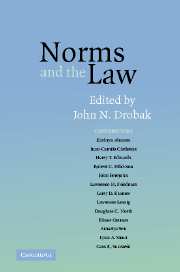Book contents
- Frontmatter
- Contents
- List of Contributors
- Acknowledgments
- Introduction
- PART ONE RATIONALITY AND NORMS
- 1 Social Norms and Other-Regarding Preferences
- 2 Damages, Norms, and Punishment
- 3 Cognitive Science and the Study of the “Rules of the Game” in a World of Uncertainty
- PART TWO NORMS OF THE COMMONS
- PART THREE JUDICIAL NORMS
- PART FOUR THE INFLUENCE OF LAW ON NORMS
- References
- Index
3 - Cognitive Science and the Study of the “Rules of the Game” in a World of Uncertainty
Published online by Cambridge University Press: 05 June 2012
- Frontmatter
- Contents
- List of Contributors
- Acknowledgments
- Introduction
- PART ONE RATIONALITY AND NORMS
- 1 Social Norms and Other-Regarding Preferences
- 2 Damages, Norms, and Punishment
- 3 Cognitive Science and the Study of the “Rules of the Game” in a World of Uncertainty
- PART TWO NORMS OF THE COMMONS
- PART THREE JUDICIAL NORMS
- PART FOUR THE INFLUENCE OF LAW ON NORMS
- References
- Index
Summary
The subject of this chapter is cognitive science, economics, and law, and some issues and problems confronting their interaction. The fundamental problems that face societies, economies, polities – and indeed the law – result from a world of ubiquitous uncertainty. Considered here is the nature of that uncertainty, its interaction with economics and legal systems, and its implications for our understanding the world and improving the human condition.
It will be useful to begin with some definitions. Economics is about how people make choices in a world of scarcity. A legal system is part of the institutional framework that structures human interaction. And uncertainty, using the Frank Knight definition, is a condition in which we cannot make a probability distribution of outcomes. Or, going to Lord Keynes's definition, it is a condition which does not allow us even to know what possible outcomes could occur.
The approach of economics to uncertainty is that it is an unusual condition. Because most economists agree that it is impossible to theorize in the face of uncertainty, they assert that what we really face is risk. According to Knight, risk does allow a probability distribution of outcomes and, therefore, we can theorize about it. If, as economists typically assume, risk rather than uncertainty is the usual state of affairs, then humans can act rationally in the pursuit of their objectives of improving the economic human condition and reducing scarcity.
- Type
- Chapter
- Information
- Norms and the Law , pp. 48 - 56Publisher: Cambridge University PressPrint publication year: 2006
- 6
- Cited by



